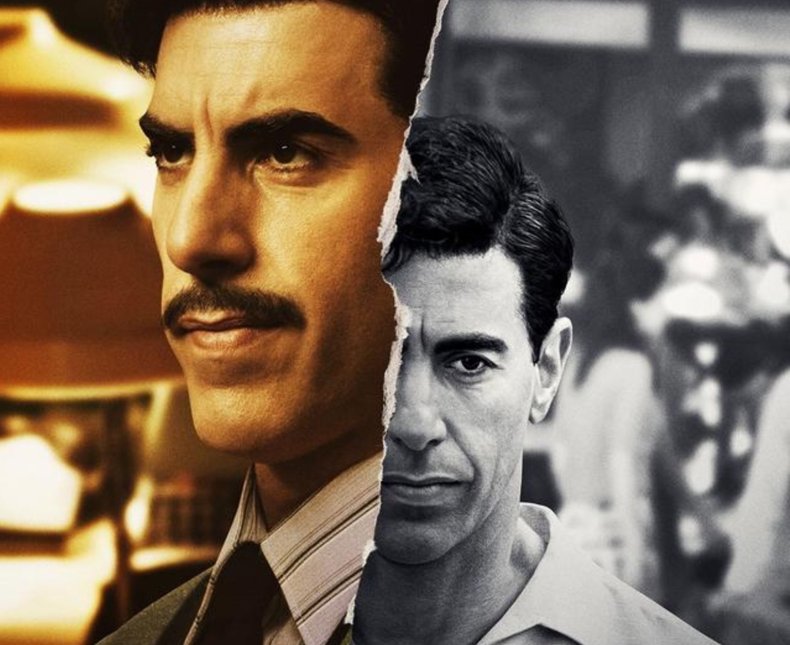What Netflix's 'The Spy' Starring Sacha Baron Cohen Gets Wrong About Eli Cohen
Did you spend your weekend binge-watching Netflix's taut thriller, The Spy? You're not alone.
The six-part drama about Israeli spy Eli Cohen has gripped viewers and critics alike with its pulse-racing tale of espionage and a deceptively good dramatic performance by Sacha Baron Cohen, better known for his comedy work, as the Mossad agent.
Show creator Gideon Raff's limited series has brought renewed attention to the life and work of Eli Cohen. Cohen went undercover in Syria as Kamel Amin Thaabet in the early 1960s, aligned himself with key military and government personnel and fed intel back to Israel.
But as with all fictional works that derive from real-life events, The Spy, perhaps for reasons ranging from time constraints to story relevance, omits some points in Cohen's story.
If you've already watched all of The Spy and are curious to know more about Cohen, then these accounts of the real-life Cohen might make for curious reading.
Warning: This article contains spoilers for all six episodes of The Spy.

Were Eli Cohen and Amin al-Hafiz really close friends?
The Spy sees a friendship blossoming between Eli Cohen and Amin al-Hafiz, the future president of Syria, that begins as Cohen first goes undercover as Thaabet in Buenos Aires and mutually benefits them both for years—right through to Cohen's discovery as an Israeli spy and subsequent execution.
In the show, Cohen—as Thaabet—befriends Hafiz in Buenos Aires and later in Damascus helps Hafiz's Ba'ath party seize power. For his loyalties, Hafiz grooms Thaabet to be deputy defense minister in his government.
In real life, the closeness between Hafiz and Cohen has been disputed by the former president of Syria, who claimed in a 2001 interview with Al Jazeera that they couldn't have met in Buenos Aires because Hafiz was in Moscow until 1962, by which time Cohen had gone undercover as Thaabet in Damascus.
Monthir Maosily, a former bureau chief for Syrian president Hafez al-Assad, claimed in 2007 that Hafiz and Cohen were not as close as was made out and that stories of Cohen infiltrating the very top of Syrian politics "had been exaggerated to undermine Syria, as if he was a spy who had transmitted Syria's deepest secrets."
Hafiz ordered Cohen's execution after he was convicted of espionage in 1965. The president was ousted from power a year later in 1966. He died in 2009.
The Ba'athist coup and Eli Cohen's role
As depicted in Episodes 4 and 5 of The Spy, Cohen aligns with Hafiz and the Ba'ath political party to overthrow the reigning government of Syria in March 1963.
In Episode 5, Cohen's playboy-esque Thaabet hosts a sex party at his apartment to distract key government and military officials while the Ba'ath Party's military committee seizes power in Damascus. While there are reports that Cohen hosted parties that would devolve into orgies at his apartment, in order to gain the trust of high-level people in power, there's no concrete evidence that he played a role in the March 1963 coup.
Also in Episode 5, viewers see Hafiz assume power after demanding the resignation of Syria's then-president, Nazim al-Qudsi. Qudsi was ousted from power as a result of the March 8 coup, but Hafiz did not take power until months later.
The new Ba'ath government initially installed Lu'ay al-Atassi as president in March 1963. He lasted until just July that year when he resigned in protest of the Ba'ath military committee executing dissenting rivals who tried to stage a coup for power. It was after Atassi resigned on July 27 that Hafiz was named president.
Did Eli Cohen's brother really discover his identity?
In the final episode of The Spy, Cohen's brother Maurice, a Mossad analyst, confronts him after discovering he is the secret Agent 88 in Damascus.
In Episode 5, Maurice puts the clues together when he covers for the regular analyst that communicates with Cohen using Morse code. During their exchange, Cohen signs off by asking, "Did N get the Singer?" Maurice isn't sure what this means. Later, visiting his sister-in-law, Cohen's wife Nadia, he notices that she has a brand new Singer sewing machine in her home.
According to Maurice Cohen, this really happened.
But what happened next apparently deviates from the way it appears in the show.
In a February 2006 interview with Jewish Magazine, Maurice Cohen said that he informed his brother that he knew he was "our man in Damascus" in an intriguing way, rather than outright confronting him as seen in The Spy.
Maurice Cohen told his brother he had a new phone line installed in his house and "gave the number of his apartment in Damascus, which I had received in a message just before he'd come home."
"He began writing the number but stopped abruptly and, looking flushed and flustered, mumbled under his breath about needing to run out to the supermarket before it closed. I had gotten under his cover," said Maurice Cohen.
"Soon after, my commanding officers summoned me to my base and informed me that Eli had spoken to them about the phone number incident. They warned me not to discuss the issue with Eli anymore and to share his secret with no one."
The Spy is streaming globally on Netflix.


Geen opmerkingen:
Een reactie posten